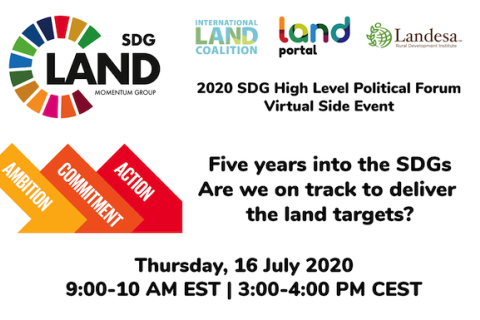
Topics and Regions
Romy leads the development of Land Portal's Country and Thematic portfolios, as well as the curation and ingestion of land-related publications and statistical datasets.
She is a communications specialist and policy advisor/project manager with more than 20 years of experience. She has worked previously with Embrapa (Brazil), CIFOR, FAO, GIZ, amongst other organizations on topics such as community forest management, payments for environmental services and agriculture & food security policy.
For the last 10 years her work has focused on land governance while as a project manager. In 2015 she supported the Global Donor Working Group on Land to advocate and secure SDG indicator 1.4.2 on land tenure security.
Romy holds a BA in Journalism from the Federal University of Pará, Brazil, and an Master of Science in Environmental Governance from the University of Freiburg, Germany.
Details
Affiliation:
Location
Contributions
Displaying 111 - 120 of 129Five years into the SDGs: are we on track to deliver the land targets?
Acknowledging the centrality of land issues to end hunger and achieve sustainable development, countries have agreed to meet ambitious land targets by 2030. Five years into the SDGs, persistent land insecurity, land evictions, threats to land rights defenders and other challenges show that the land promises are not being delivered.
Presentation: Legal Guide on Land Consolidation
This presentation was given at the Webinar "Land Consolidation Legislation: FAO Legal Guide and Its Application at the Country Level" on 18 June 2020. It explores the content of the new FAO Legal Guide on Land Consolidation, as well as the context that led to the development of this guide.
Presentation: The Need for Land Consolidation
This presentation was given at the Webinar "Land Consolidation Legislation: FAO Legal Guide and Its Application at the Country Level" on 18 June 2020. It sets the scene on the need for land consolidation by explaining the problem it addresses, namely, land fragmentation. The presentation also explores whether land markets can solve the issue of land fragmentation, and can be achieved with land consolidation and who are the beneficiaries.
Legal guide on land consolidation
Land consolidation is a highly effective land management instrument that allows for the improvement of the structure of agricultural holdings and farms in a country, which increases their economic and social efficiency and brings benefits both to right holders as well as to society in general. Since land consolidation gives mobility to land ownership and other land rights, it may also facilitate the allocation of new areas with specific purposes other than agriculture, such as for public infrastructure or nature protection and restoration.
Land consolidation or…. can land markets solve land fragmentation?
It happened on the 29th of January 2020 in Bitola in North Macedonia. More than 200 landowners from Egri village gathered in Bitola’s theatre, taking turns to vote on the Land Consolidation Plan. The serious faces of men and women, old and young, were a sign that they may have been as nervous as we were ourselves. The voting on the first majority based land consolidation ever in the country was coming to an end. And then the result was there….. 83% in favour of land consolidation! The villagers were cheering. Our team was overwhelmed by emotion.
Safeguarding tenure rights in land consolidation
I was assigned to lead the preparation of the assessments and amendments to the land consolidation legislation in 2016. That appeared to be a burdensome task. The first two land consolidation projects in North Macedonia were initiated according to the existing Land Consolidation Law and the implementation was blocked. The Law simply had no legal solutions for the identified field situations. The problems were many and each was ascending the other in its magnitude and sensitivity.
Multi-purpose land consolidation in support of sustainable development
The increasing number of salmon in the Skjern River in Denmark is a positive sign, as the Danish salmon is the only strain of wild salmon left in Danish rivers. Before the Skjern River Nature Restoration Project, the salmon had almost gone extinct owing to the state of the environment. The project area now offers ideal conditions for flora and fauna and has already acquired great natural value. In fact, it has already grown into a bird site of national importance.







